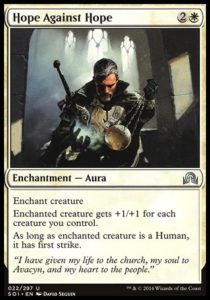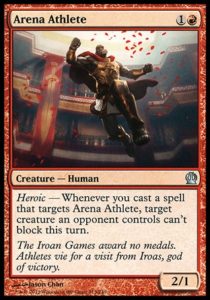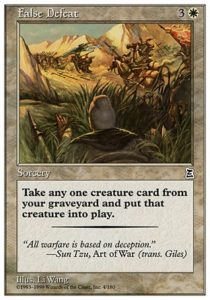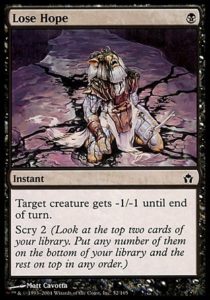Today, the Great Designer Search has its biggest cut. Over 3,000 people submitted their essays, but of those only 94 will advance to the third and final trial. One needs an A+ on the 75 question multiple choice exam.
I have…no idea how many questions I got right. I’m anxious, I’m excited, and I can’t wait for results to be posted. I’ve read the (publicly posted) answers of other folks, more practiced designers and Magicians than I. We don’t agree on all of our answers, and there is sufficient disagreement that it’s impossible for all (if any) of us to make the cut. It’s times like these that I remind myself of heuristics: rules of thumb that apply to Magic, or just life in general. Today, I’d like to share some of them with you.
Allow yourself to Hope.
For many years, when I really wanted something, I tamped down on my expectations. I was afraid I’d fall short, so I tried to cushion the impact if I failed. That way, if I got what I wanted, I could be pleasantly surprised, and if I didn’t, I’d avoided the anxiety leading up to the failure and the sadness afterwards.
This does not work.
The idea is simple: excitement and anxiety are two sides of the same coin. Reduce one and you reduce there other. Therein lies the fallacy: anxiety and excitement accompany one another, but don’t have a causal relationship between each other. By tamping down on your excitement, all you’re doing is reducing your joy without affecting the anxiety of anticipation or the sting of failing to make your mark. If the harsher experiences are going to happen regardless of what you do, the best course is to allow yourself the joy of excitement as well.
No one Deserves to win.
This is a personal mantra of mine. I tell myself it between rounds at every Grand Prix I go to, particularly when I’m doing well. It’s not a dig at myself or anyone, it’s a reminder of what matters and what doesn’t.
Winning is a combination of two factors: preparation and luck. Things within your control, and things outside of your control. That’s. It. You build the best deck you can, play as best as you are able, attend to your wellbeing as best you can, and have practiced as best as you could. You’re constantly at the mercy of a shuffled deck and other uncontrollable factors like how well you slept or external stresses. When something doesn’t go your way, it was either under your control and is an opportunity to learn and improve, or it was outside your control and there’s nothing you could have done (so why dwell on it?). That’s all there is to competition (and life, when you get down to it).
Everyone has played someone who doesn’t subscribe to this. They lose and they are furious. They deserved to win, but you did, instead. You know what? Deserving is a meaningless term. Winning isn’t something one is entitled to; victory is a combination of skill and luck (to steal and mangle a certain wonderful pro’s shtick). Seth Manfield, Paulo Vitor Damo Da Rosa, and Owen Turtenwald aren’t some of the best players in the world because they deserve it, they’ve earned it because they’ve done so much to control for everything within their control. They worked hard, they practiced, and they trained.
Deserving doesn’t come into play.
Allow yourself to Fail.
To compete for anything is to court failure. Triumph exists only when coming up short is possible, be it winning a PPTQ, learning how to storm off, losing five pounds, or even committing to flossing every night. To set a goal is to engage in risk. If the outcome is certain, then you haven’t accomplished anything.
This sounds great in principle, but in practice, failing is hard. The more you want and work towards something, the harder the sting when you don’t get it. The trick (which is a hard trick), is accepting that failing is supposed to suck. There’s going to be anger, sadness, indignation, despair, and all sorts of other hardly-fun feelings. These feelings are completely natural and necessary for you to process the pain of loss. They need to happen for you to move on, and they need to be felt. And sometimes, they don’t hurt as bad, and sometimes they don’t hurt at all because you won.
This article took on a bit of tonal shift when Rosewater announced yesterday (a day before the cuts) just how strict the GDS3 cut has been:
I have some info for you all on the #GDS3 second trial (aka the multiple-choice test). 3,085 people took the test. Three people got perfect scores. The cutoff ended up being 73 (of 75). 94 people advance with a score of 73 or better.
— Mark Rosewater (@maro254) January 30, 2018
There had to be a 3% cut to get to 100 people from over 3,000. We knew that going in. However, a margin of error of two questions is razor thin. I believe no WotC employee got a score higher than 74/75, so that underscores just how difficult this test was.
I’ve my own musings on the process as well as the harshness of the cut, but those are for another time. Today, we congratulate those who made it to the final trial and understand that the vast, vast majority of competitors (including many talented designers that Magic would be fortunate to have) didn’t make it past this stage. I’m no longer quite so confident in my chances (I put them, somewhat generously, at 2%), but I put sufficient effort into the process and just have to hope I got lucky where I wasn’t confident in my answers.
Congratulations to the winners, to the applicants, and to those just having fun and following at home. Hopefully some of these musings have been of use. And, as always, thanks for reading.
—Zachary Barash
Zachary Barash is a New York City-based game designer. He works for Kingdom Death: Monster, has a Game Design MFA from the NYU Game Center, and does freelance game design. When the stars align, he streams Magic.
His favorite card of the month is Enter the Unknown from Rivals of Ixalan. It’s Explore, with Explore, but not in its name, and a touch more random.





